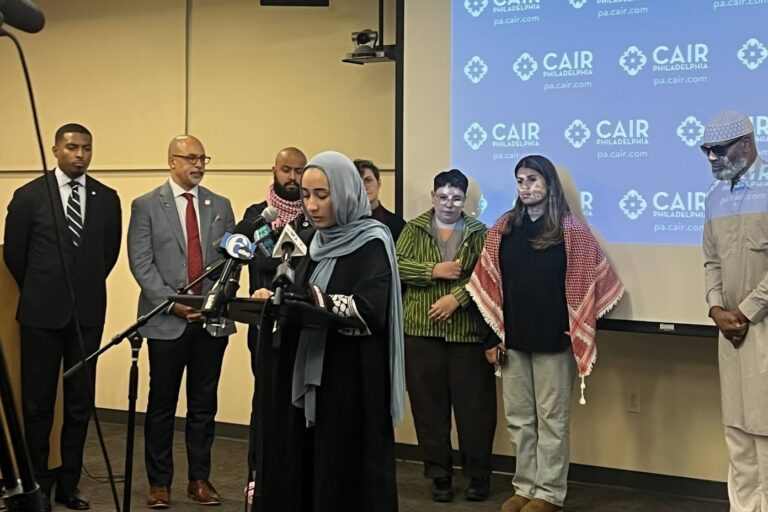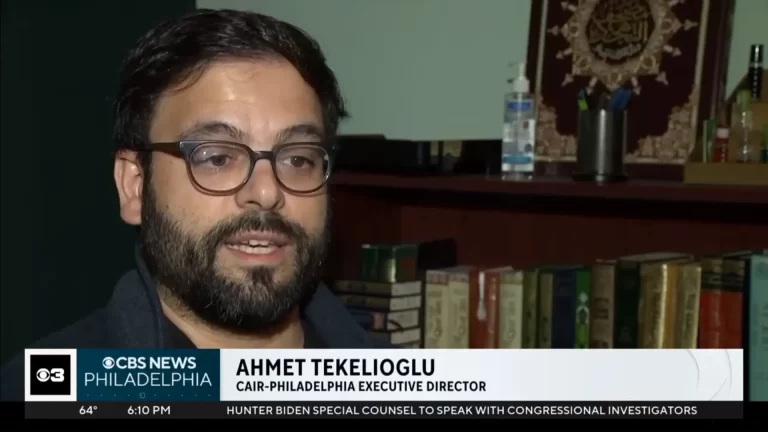
By John Hilton
Daily Record/Sunday News
Religious discrimination complaints have risen sharply in York County over the past year. All of them have come from Muslims.
York, PA – At his employment law firm, Jeremy Donham has met Muslims who claimed workplace discrimination but chose not to pursue a legal case out of fear.
In fact, he said, a Muslim walked into Allie & Donham’s office in Springettsbury Township last week to talk about a potential case of religious discrimination. Donham, who once filed a religious discrimination lawsuit against his employer in West Virginia, said he understands why such complaints are rising — both nationally and locally.
Data from the Pennsylvania Human Relations Commission shows 12 complaints alleging workplace religious discrimination in York County between July and February, and all 12 complaints were made by Muslims, said Shannon Powers, spokeswoman for the commission.
The commission received 28 complaints of workplace religious discrimination over the previous 10 years in York County, Powers said, never with more than two complaints by Muslims in a given year.
Attempts to identify and interview any of the 12 complainants were unsuccessful.
Some observers trace prejudiced opinions toward Muslims to 9/11. Others blame the Republican presidential primary for ramping up the rhetoric.
“There’s a general fear of the Muslim population, and I think it’s an unwarranted fear,” Donham said, “because I think there’s a lot of good folks who are of the Muslim faith who are not radical.”
‘Hostile climate’
During a June appearance on the Glenn Beck show, then-presidential candidate Herman Cain said he would make Muslims take a loyalty oath before hiring them for his cabinet.
Pressed by Beck on whether Mormons or Catholics would be required to make a similar pledge, Cain said they would not.
“I wouldn’t because there is a greater dangerous part of the Muslim faith than there is in these other religions,” said Cain, who dropped out of the race in December.
Dr. Ramy Nasr, a York surgeon and a practicing Muslim, was appalled by Cain’s comments. But he was more dismayed at the general reaction to them by the media and the general public.
“The fact that such comments are allowed and not sharply rebuked (by the media) shows you the hostile climate we are in today toward Islam and Muslims,” he said via email.
When it comes to the workplace, Nasr said general ignorance combined with the specific demands of Islam can create a bad situation.
“Typical American employers have no real idea . . . of what Islam is or what it’s about,” he said, “aside from whatever impressionable experience they’ve had — be it personal via co-workers or passed on through the media.”
Mujahid “Rick” Ramos, imam of the congregation Masjid At-Tawheed in York, said the tone of the presidential campaign is responsible for ratcheting up “Islamophobia.”
Nasr partly blames the media for permitting discriminatory statements to go unchecked and for baiting other candidates to pile on.
Eyes are telling
Rabyia Ahmed is always on the lookout for the stares, the bemused expressions of ignorance and, on occasion, the eyes of hate. The assistant director of multicultural affairs at York College, Ahmed wears a hijab in accordance with Islamic tradition.
The head scarf causes her to stand out in a crowd.
“You can tell. I believe a person’s eyes are very telling of what they are thinking,” said Ahmed, who was born in Karachi, Pakistan, and moved to York 11 years ago. “I’ve never experienced anything that was over the top, but I’ve had things said to me.”
While she has never experienced employment discrimination, Ahmed said she has a friend from a neighboring county who is convinced she didn’t get hired for a job because of her hijab. The friend did not file a complaint, she added.
Muslims have five mandatory prayers spread throughout each day. Attempting to combine prayer with work can cause problems, Nasr said.
“It’s inevitable that you will need to pray at least one (if not more) prayer while at work,” he said in an email. “Either asking for the five minutes to do so or being seen performing the prayer makes your religion even higher profile.”
And it isn’t just the workplace. The (Harrisburg) Patriot-News reported in January that Muslim students in the West Shore School District might be allowed to pray during the school day. That angered some parents, the newspaper reported.
Ramos is one of two practicing Muslims who work at United Coolair Corp. in York. The company, which declined comment, allows Ramos and Athar Khan to pray during the workday and leave work Friday afternoons to attend weekly prayer services.
“It is sad that many employers make accommodations for their employees to smoke,” Ramos noted, “but are reluctant to make similar accommodations for a Muslim employee to pray, which takes about the same amount of time.”
Workplace religious discrimination takes many forms, said Amara Chaudhry, civil rights director for the Philadelphia office of the Council on American-Islamic Relations.
It can be overt discrimination from a boss against an employee or from another employee. It can take the form of rules disproportionately applied to a Muslim employee. But it can also be non-confrontational and almost unseen, Chaudhry explained.
For example, a promotion could be denied to a Muslim employee who is qualified.
“It’s troubling that we have not seen the discrimination cases decreasing despite the outreach we are doing,” she said.
‘Legitimizes hate’
Chaudhry said police were emboldened to target and profile Muslims after 9/11.
“It legitimizes hate, and private individuals feel empowered to engage in the same conduct,” she said.
All agree that only time, training and education will reverse religious discrimination against Muslims.
“The first thing we need to overcome is fear of the unknown,” Nasr said. “Just because we’re unfamiliar with something doesn’t mean we should automatically resort to fearing it.”
Ahmed frequently conducts diversity training workshops to educate people on Muslim traditions such as the hijab. She said employers need a comprehensive training program.
“I think that’s a problem a lot of employers have,” she said. “You can’t just do it once and be done with it, especially if it’s an issue that’s ongoing.”
A business-like approach
WellSpan Health has perhaps the most diverse workforce in York County, says spokesman Barry Sparks.
Its roughly 9,000 employees represent all classes of sex, race, gender, religion and national origin. The number one employer in York County, WellSpan offers diversity training on more than 80 different topics.
Workplace discrimination is not only against the law, it undermines what WellSpan does, said Bob Batory, senior vice president of human resources. The company is in the health care business, he said, and its customers come from all walks of life.
It makes good business sense to have a staff of compassionate people, Batory said.
“I find employers who try to be exclusionary and try to pick and choose what they believe in and make everyone else conform to it are fighting an uphill battle,” he said.
WellSpan employees can wear specific dress to honor their religion, or pray during work hours, or use flex time to take off work on religious holidays. The company even recognizes the right to hold no beliefs, Batory said, acknowledging WellSpan’s atheist employees.
“We take a very broad definition of diversity,” he said. “It’s really all of the values that make us individuals.”
Even the most diligent diversity policies will not completely remove the threat of a lawsuit.
WellSpan was sued by Dr. Parsa Mohebi in 2007. He claimed York Hospital failed to promote him to fourth-year residency status because of he was Iranian.
Mohebi claimed he never received any notice of shortcomings or problems in his training. Judge Christopher Conner ruled for the hospital in 2009.
A national trend
The Associated Press recently reported that federal job discrimination complaints rose to an all-time high last year, led by an increase in bias charges based on religion and national origin.
The Equal Employment Opportunity Commission received nearly 100,000 charges of discrimination during the 2011 fiscal year, the most in its 46-year history.
Charges of religious discrimination jumped by 9.5 percent, the largest increase of any category. Claims of bias based on ancestry or country of origin rose 5 percent.
Experts say the increase reflects the growing diversity of the nation’s work force, said Ron Cooper, a former general counsel of the EEOC who now works in private practice with Steptoe & Johnson in Washington, D.C. “We’re seeing more workers from India, Pakistan and other countries that bring additional religious complexity to the work force.”
The story behind the story
Religious discrimination complaints generally start with the state Human Relations Commission, which received 12 complaints from July 1 through March 1.
The state HRC denied a Right-to-Know request for information about the complaints, citing state law that exempts its records.
Area employment attorneys, Islamic mosques, diversity trainers, and agencies such as the American Civil Liberties Union and the Council on American-Islamic Relations also could not identify anyone claiming religious discrimination in York County.
York City residents can also file complaints with the city HRC.
Stephanie Seaton, director of the York commission, said the agency received two complaints of workplace religious discrimination in 2010 and three in 2011. She did not return phone calls seeking more information.
Duty of employers
Under federal law, employers cannot treat a job applicant or employee unfavorably because of the person’s religious beliefs. The law covers areas that include hiring, firing, pay, job assignments, promotions, layoffs, training and fringe benefits. Best practices, according to the U.S. Equal Employment Opportunity Commission, include:
— Engaging with and educating customers who object to an employee’s religious garb;
— Having a “well-publicized and consistently applied” policy on
harassment, including for religion;
— Training managers to deal with religious accommodation requests;
— Considering flexible leave and scheduling policies that can allow people to meet religious needs;
— Training managers to assess any disruption that could result from allowing an employee to pray in the workplace, as opposed to guessing, and to figure out how accommodations can be made to avoid actual disruption.
Source: U.S. Equal Employment Opportunity Commission
Discrimination alleged
Jeremy Donham, was in his 20s when he took a job as campus pastor at a West Virginia Christian high school to work with young people.
He adhered to the Pentecostal faith, but since the school knew it when they hired him, Donham didn’t think it would be a problem. Within a year or so, he claimed, it became a problem.
“They began to scrutinize my employment and my efforts to work with the students on campus,” said Donham, 46, who lives in Wrightsville with his family. “They were so heavily scrutinizing me that I began to realize that this was more than just normal scrutiny you would receive on the job.”
He said the school asked him to sign an agreement admitting fault with his teaching methods. He refused and said they fired him.
Donham sued, but the judge’s ruling went against him. He did not appeal.
The school has since changed ownership and been renamed, although it remains a Christian school. Johan Pot, interim administrator for the school, confirmed that Donham was a teacher there in the late 1990s, but said no administrators or board members remain from that time.
“An organization that is faith-based can choose to make (religious practices) a part of their job qualification,” Donham said. “But we could have argued … that there shouldn’t have been discrimination of one religion against the other.”
The episode served to push Donham toward a legal career. He later earned a law degree from Widener University and practices employment discrimination law with Allie & Donham in Springettsbury Township.





